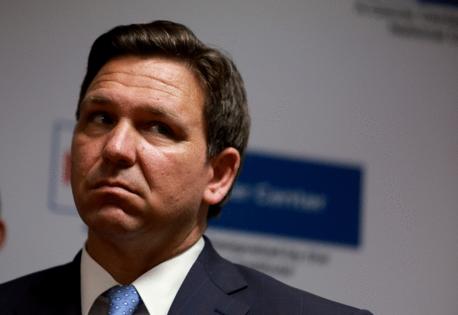Lisa Jarvis: Florida made a vaccine mistake. Now, it's everyone's problem
Published in Op Eds
Vaccine policy in the U.S. is rapidly dividing into two opposing camps: state leaders who are prioritizing access to shots, and those who are taking increasingly aggressive steps to undermine confidence in them.
That piecemeal policy approach, enabled by federal health leadership that appears to question the value of, and restrict access to, vaccines almost daily, defies the basic tenets of public health and will leave Americans nationwide vulnerable to outbreaks.
The latest fracture came from Florida Surgeon General Joseph Ladapo, who on Wednesday announced that his state would become the first in the country to eliminate vaccine mandates. That could mean Florida schoolchildren would no longer be required to get the standard immunizations that prevent infectious diseases like polio and rubella from roaring back.
Meanwhile, the governors of California, Oregon and Washington — also on Wednesday — said that deteriorating trust in the Centers for Disease Control and Prevention had driven them to form a regional public health alliance that will follow vaccine guidance from respected medical groups rather than the federal government.
The juxtaposition of the two approaches to public health policy is jarring — and surely baffling to a public left wondering whom to trust and what all of this means for their health.
States have always set their own vaccine policies, but they have generally aligned with the CDC’s previously carefully considered recommendations.
Florida’s new policy was unveiled at a stunning press conference during which Ladapo and Republican Gov. Ron DeSantis framed the decision as a courageous act in support of “medical freedom.” Ladapo repeatedly called mandates immoral, claiming that “every last one of them is wrong and drips with disdain and slavery.”
On a practical level, Ladapo can’t just issue a blanket ban on mandates — he needs the buy-in of Florida lawmakers for that. But he does have the authority to tinker with requirements for some shots. Although a handful of routine immunizations — including polio, diphtheria, rubeola, rubella, pertussis, mumps and tetanus — are required by law, the state health department long ago expanded the list to include additional vaccines such as chickenpox and hepatitis B. “Those are gonna be gone, for sure,” Ladapo said.
Even before this new policy, Florida, like many states, has experienced a steady decline in childhood vaccination rates. The state has long provided a religious exemption from vaccines, and in recent years, many more parents have sought them. They’ve no doubt been encouraged by rhetoric from Ladapo, who has spread misinformation about the COVID vaccine and last year failed to advise parents to get their children immunized during a measles outbreak. As a consequence, the number of Florida kindergarteners who are up to date on their shots dipped below 89% during the last two school years.
With the new policy, Ladapo is now making it much easier for parents to skip their children’s vaccinations. But he and DeSantis are also reinforcing the view that vaccines are a matter of personal choice — that making them optional is simply empowering parents, not endangering the broader public by potentially weakening community immunity against infections.
Worse, they are setting a precedent for increasingly extreme state-level, anti-vaccine policies. The pandemic unleashed a torrent of vaccine-related bills, many of which targeted COVID immunization mandates or mRNA technology. Not all became law, but politicians might now feel more emboldened to broaden their efforts to other vaccines — and be more likely to succeed.
Of course, the rhetoric on vaccines coming from federal health leadership further fuels laws like Florida’s. Health Secretary Robert F. Kennedy Jr. has made a series of decisions designed to undermine confidence in, and impede access to, vaccines. That project escalated last week when he fired CDC Director Susan Monarez after she tried to block unscientific changes to vaccine recommendations.
While Republican governors might be taking the demise of the CDC as an invitation to weaken vaccine policy, blue-state leaders are trying to strengthen confidence in and access to shots — and are increasingly looking outside federal health agencies for guidance.
The governors of California, Oregon and Washington said that the goal of the West Coast Health Alliance was to ensure that “public health recommendations are guided by safety, efficacy, transparency, access, and trust.” Rather than rely on the CDC, they will coordinate health guidelines and align vaccine recommendations with advice from medical organizations and their own public health officials.
A similar alliance is coalescing on the East Coast, where Democratic Massachusetts Governor Maura Healey announced she would lead “a bipartisan coalition of states to coordinate on vaccine recommendations.”
States are smart to work together on maintaining clear, evidence-based guidelines for vaccines — and, in a time of significant uncertainty about what federal policy changes might come next, they should ideally also consider how to ensure reliable access to essential shots.
At the same time, the lack of a unified message on public health is sure to make the public uncertain about whom to trust. And no one will remain protected from disease under a patchwork policy system. As the recent measles outbreak made clear, viruses don’t recognize state lines. In the absence of a functional, unified CDC, we are all at risk.
____
This column reflects the personal views of the author and does not necessarily reflect the opinion of the editorial board or Bloomberg LP and its owners.
Lisa Jarvis is a Bloomberg Opinion columnist covering biotech, health care and the pharmaceutical industry. Previously, she was executive editor of Chemical & Engineering News.
©2025 Bloomberg L.P. Visit bloomberg.com/opinion. Distributed by Tribune Content Agency, LLC.
























































Comments